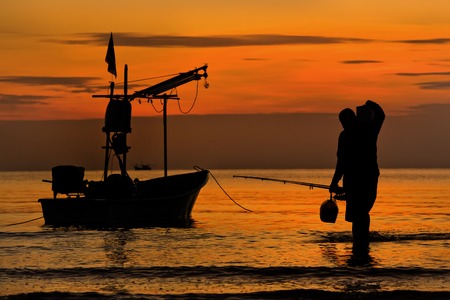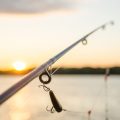Introduction to Night Fishing in the UK
Night fishing has long been woven into the fabric of the UK’s angling culture, offering a unique blend of tranquillity, adventure, and challenge that attracts both seasoned anglers and enthusiastic newcomers. Whether it’s along the rugged Cornish coastline, the pebbled beaches of Sussex, or the tidal estuaries of Wales and Scotland, night fishing is more than just a pastime; it’s an escape from the bustle of daily life and a chance to connect with nature under the cover of darkness. The popularity of night fishing continues to grow across Britain, thanks in part to its reputation for producing larger catches and offering a more peaceful experience compared to daytime sessions. Yet, this rewarding pursuit comes with its own set of challenges—particularly when it comes to understanding how local weather patterns and tide times can impact safety and success. For many UK anglers, mastering these elements is part of the thrill, requiring a combination of knowledge, preparation, and respect for ever-changing British conditions.
2. Typical British Weather Patterns and Their Impact
One of the most distinctive aspects of night fishing in the UK is contending with its famously unpredictable weather. From a gentle drizzle to dense coastal fog, British weather can shift rapidly—sometimes within the same evening! Understanding these patterns is crucial for planning a safer and more enjoyable night fishing experience.
Classic British Weather Conditions
| Weather Condition | Impact on Night Fishing | Preparation Tips |
|---|---|---|
| Drizzle & Light Rain | Makes surfaces slippery; reduces visibility slightly; increases humidity. | Wear waterproof clothing, use non-slip boots, pack spare dry layers. |
| Heavy Rain | Significantly reduces visibility; water levels may rise; gear may get soaked. | Use quality waterproofs, bring a shelter, secure tackle boxes against water ingress. |
| Fog & Mist | Dramatically limits visibility; complicates navigation along the shore or pier. | Carry a strong headlamp, use reflective tape on gear, always fish with a buddy. |
| Windy Conditions | Makes casting challenging; can chill anglers quickly; impacts bait presentation. | Dress in windproof layers, anchor gear securely, adjust casting technique. |
| Crisp Clear Nights | Usually colder; better moonlight but can see temperature drops suddenly. | Layer up for warmth, bring hot drinks, check dew point to avoid condensation on equipment. |
Navigating Changeable Climates
The key to thriving under Britain’s changeable skies is preparation. Always check the latest local forecast before heading out and be ready to adapt your plans. Packing an extra jumper or waterproof jacket might seem excessive at home, but it could make all the difference when temperatures dip after midnight or a shower rolls in unexpectedly.
Local Knowledge Matters
If you’re new to an area, chat with local anglers—they’re often happy to share insights about how certain spots handle the weather. Some beaches or estuaries are prone to thick fogs or sudden gusts, while others remain relatively sheltered. Knowing what to expect not only keeps you comfortable but also safer as you fish into the small hours.
![]()
3. Understanding the Tides: Essential UK Know-How
Any seasoned British angler will tell you: tides are the unsung heroes of a successful night fishing trip. The ebb and flow of water, driven by the gravitational pull of the moon and sun, dramatically influence fish behaviour along the UK’s rugged coastlines and winding rivers. Timing your cast with the right tidal movement can be the difference between an empty bucket and a bumper haul. But how do you get it right?
The Role of Tidal Movements in UK Angling
Across the UK, tidal shifts shape not only where fish gather but also when they feed most actively. At high tide, fish venture closer to shore in search of food stirred up by rising waters, while low tide can expose hidden sandbanks and channels teeming with life. Spring tides—those with the greatest range between high and low—are particularly favoured for night sessions as they encourage more feeding activity, especially for species like bass, cod, or flounder.
Reading Tide Tables Like a Local
Tide tables are a British angler’s trusty companion, readily available online or at local tackle shops. They provide detailed timings for high and low tides each day, specific to your chosen stretch of coastline or estuary. When planning your nocturnal adventure, check not only the peak times but also the rate at which the tide turns—known as ‘slack water’—which often offers prime conditions for bites.
Local Knowledge: A Night Fisher’s Secret Weapon
While tide tables give you the raw data, nothing beats local insight. Speak with regulars at your spot or visit a nearby angling club; they’ll know how certain beaches or river bends ‘fish’ on different tides and may even share tips on those lesser-known marks that come alive after dark. By blending these resources with a careful eye on the forecast, you’ll soon be navigating Britain’s unique waters like a pro—and reeling in more than just stories.
4. Safety Considerations for After-Dark Angling
Night fishing in the UK is a cherished pastime, but it comes with unique challenges that require careful preparation and awareness. Understanding local risks and following established safety guidelines will ensure your angling experience remains enjoyable and incident-free. Below, we highlight UK-specific advice from experienced British fishermen, focusing on coastal hazards, wildlife encounters, and general night fishing tips.
Coastal Hazards Unique to the UK
The UK’s rugged coastline offers fantastic fishing spots but also presents real dangers after dark. Fast-rising tides, slippery rocks covered in seaweed, sudden drops, and unpredictable weather changes are common. Always check tide times before heading out and keep an eye on your exit routes—many British anglers have found themselves cut off by incoming tides or stranded on isolated rocks.
| Hazard | Precaution |
|---|---|
| Fast-Rising Tides | Consult local tide tables and set alarms to remind you when to move |
| Slippery Surfaces | Wear sturdy boots with good grip and use a head torch for visibility |
| Sheltered Coves | Avoid fishing alone; let someone know your location |
| Sneaker Waves & Swells | Keep a safe distance from the water’s edge during rough conditions |
Local Wildlife Encounters
The UK’s coastal and river environments are home to various wildlife that can surprise the unwary night angler. Seals may approach quietly out of curiosity, while nesting birds may be disturbed if you stray too close to their roosts. Foxes and badgers are common around inland waters, sometimes attracted by bait or catches left unattended.
Wildlife Safety Tips
- Respect nesting zones marked by local authorities—especially during spring and summer.
- Keep all food and bait sealed to avoid attracting animals.
- If approached by seals or otters, remain calm and do not attempt to feed or touch them.
- Avoid shining bright lights directly at wildlife to minimise disturbance.
Advice from Seasoned British Fishermen
Veteran UK anglers recommend always carrying an updated OS map (Ordnance Survey), as mobile signals can be patchy along many stretches of coast. Wear layers suitable for unpredictable weather, bring a fully charged headlamp plus spare batteries, and pack a basic first aid kit. Many also suggest joining a local angling club to stay informed about site-specific risks and best practices.
Essential Night Fishing Safety Kit Checklist:
- High-visibility jacket or armband
- Waterproof footwear
- Spare torch/headlamp with batteries
- Tide timetable app or printout
- Laminated map of fishing area
- Mobile phone in waterproof pouch
- First aid kit & whistle for emergencies
By respecting the unique conditions of the UK’s waterways and heeding advice from local experts, night fishing becomes not only safer but even more rewarding—a true British adventure under the stars.
5. British Gear and Local Apps for Weather & Tide Updates
When it comes to night fishing in the UK, being prepared with the right gear and up-to-date local knowledge is half the battle won. Savvy anglers know that a classic British waterproof jacket is essential — think breathable yet robust brands like Barbour or Musto, which keep you dry when the drizzle turns to downpour. Layering is a must, so opt for moisture-wicking base layers and thermal mid-layers to stay warm as temperatures drop along our breezy coastlines. For footwear, sturdy wellies from Hunter or insulated boots are favourites among locals, ensuring comfortable footing on muddy banks or slippery piers.
Beyond clothing, staying informed in real time about weather changes and shifting tides is key for safety and success. In true British style, many rely on trusted local apps and resources. The Met Office app is a go-to for accurate weather forecasts with region-specific detail. For tide times, ‘Tides Near Me’ and ‘UK Tides’ apps offer user-friendly interfaces showing up-to-the-minute tidal data across hundreds of UK locations — perfect for planning your session down to the last cast.
For those who love a bit of tech, the Navionics Boating app provides detailed marine charts, live wind forecasts, and tides all in one place, making it popular among serious coastal anglers. Alternatively, check out Magicseaweed if you’re near surf beaches; its comprehensive swell and wind reports help predict not just fishing conditions but also beach safety factors at night.
Don’t forget the value of good old-fashioned local knowledge either — many tackle shops display daily printed weather and tide charts, or chat with seasoned anglers at your favourite spot for first-hand updates. By combining practical British-made gear with modern digital resources, you’ll be fully equipped to make safe and enjoyable decisions no matter what the unpredictable UK weather throws at you.
6. Community Tips and Tales
One of the most rewarding aspects of night fishing in the UK is the sense of camaraderie among local anglers, each with their own tried-and-tested advice for thriving under Britain’s ever-changing skies. From the windswept coasts of Cornwall to the tranquil banks of the Norfolk Broads, British fishers have gathered a wealth of knowledge passed down through generations. Here are some cherished stories and time-honoured tips that can help you make the most of your nocturnal adventures by the water.
Listening to Local Wisdom
Seasoned UK anglers often say, “When in doubt, ask a local.” Whether it’s a mate at the pub or a friendly face at the bait shop, tapping into community knowledge is invaluable. Locals can tell you which stretches of river light up after dusk, how certain tides bring shoals close to shore, or when a warm sou’wester signals a promising night ahead. Don’t be shy about joining online forums or social media groups dedicated to your chosen spot—these are goldmines for up-to-date advice on weather quirks and fishing conditions.
Tricks Passed Down Through Generations
British anglers have developed clever tricks to cope with fickle weather and shifting tides. Some swear by checking seaweed washed up on beaches: if it’s dry on top, expect clear skies; if damp, rain may be on its way. Others recommend watching moon phases—full moons often mean brighter nights but sometimes quieter waters, so plan accordingly. Carrying a trusty flask of tea is almost non-negotiable; not only does it keep you warm during chilly spells, but sharing a cuppa can spark new friendships along the bank.
Tales from the Water’s Edge
No discussion would be complete without tales from those who’ve braved stormy nights or reeled in record catches under starry skies. From narrowly escaping rising tides on Welsh estuaries to landing an unexpected specimen as fog rolled in across Scottish lochs, these stories remind us that night fishing in Britain is as much about adventure as it is about technique. Sharing your own experiences—successes and near-misses alike—strengthens the angling community and ensures that practical wisdom continues to flow.
Embracing the Unique Charm of British Nights
Ultimately, enjoying night fishing in the UK means embracing unpredictability and making use of local knowledge. By swapping stories and tips with fellow anglers, you’ll not only fish safer and smarter but also become part of a vibrant tradition that celebrates every magical moment spent beside Britain’s waters after dark.


